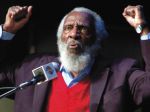As members of a live audience and listeners around the nation settled in for the Bev Smith Show Town Hall Meeting, titled “The Disappearing Black Community and How We Get It Back,” they were in for somewhat of a surprise. What they learned from the panel of national figures is that the Black community has never existed.
 |
| BEV SMITH speaks to live audience. (Photo by Rossano P. Stewart)
|
“Contrary to what people think, we do not have a Black community. What we have are Black neighborhoods. Black folk in America have not prospered because we don’t have communities,” said Claud Anderson, president, Powernomics Corp. of America. “We fail to play as a team. You’ll never find a Black town because we’re too busy trying to integrate.”
The panel made up of civil rights activists and scholars at the August Wilson Center for African American Culture Nov. 12 gave directives for how African-Americans should go about forming Black communities. They stressed the importance of investing in Black-owned businesses and several demonized integration as a system used to rape African-Americans of their culture.
“In socioeconomic terms we are exactly where we were in the 1960s. Black folk are now a permanent under class,” Anderson said. “Integration didn’t give Black folks anything. They told Black people if you want to come into our communities, you have to strip yourselves of your values.”
Bev Smith, a nationally syndicated radio personality, served as the evening’s moderator and host, adding her traditional brand of stark criticism and probing the audience to see what Blacks had done to contribute to the current crisis.
 |
| GEORGE CURRY
|
“This is the first time in radio that there has been a town hall meeting centering on us,” Smith said. “Why are we in this mess we are in. What have we done to contribute to it? We have to take responsibility. We don’t need to worry about the Klan anymore. We have us killing us.”
Several panelists indicted many of their fellow African-Americans who had gained wealth. They said all too often these people become successful and move out of Black neighborhoods, taking their money and resources with them.
“We now have this class divide that we didn’t used to have. There are two Black Americas,” said Ron Daniels, president of the Institute of the Black World 21st Century. “One of the problems with the civil rights movement is it was not supposed to be about assimilating. Every other group came here with their culture in tact.”
“Our community has gone to hell. We forgot what worked for us,”
said George Curry, a journalist and syndicated columnist. “We ought to be fighting to have institutions where we have our own voice.”
Representing the voice of youth, many of whom were born after the civil rights movement, Min. Lennox Yearwood urged the audience to open their eyes to the severity of the current civil rights struggle. However, he said this battle, in part due to the emergence of a new brand of oppression he deemed “James Crowe Jr. Esq.,” would need to be fought differently.
 |
| DICK GREGORY
|
“We can’t fight this the way we did before. This is our lunch counter. You have to recognize that this is our moment,” said Yearwood, president, Hip Hop Caucus. “It is important for us to look at other generations for leadership but we have so much superficial leadership. There are people who are not true activists. They are time card activists.”
With his usual humor, legendary activist Dick Gregory painted a picture of Black America and how little economic conditions have improved for large segments of African-Americans.
“I know people who’ve never had a job and they’re worried about the economy. What difference does it make to you,” Gregory said. “People say ‘when we was young we didn’t have to lock our doors.’ You didn’t have nothing. And you have people talking about ‘we need to go back to the good old days,’ well we should be almost there.”